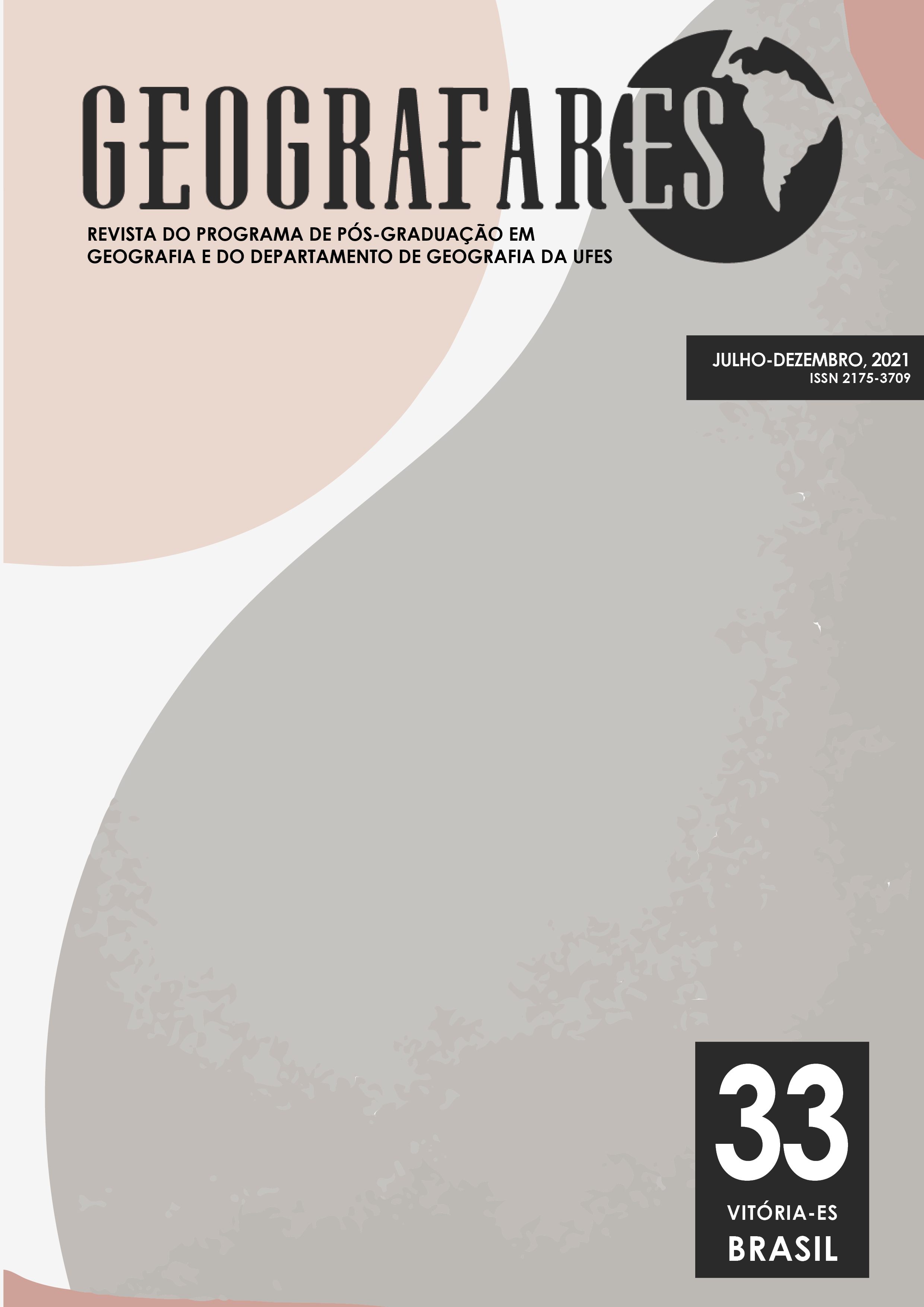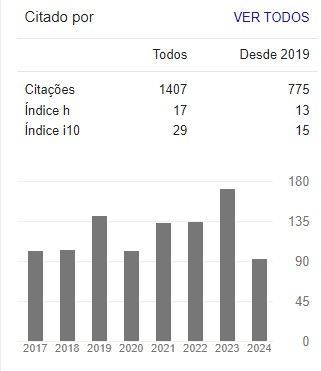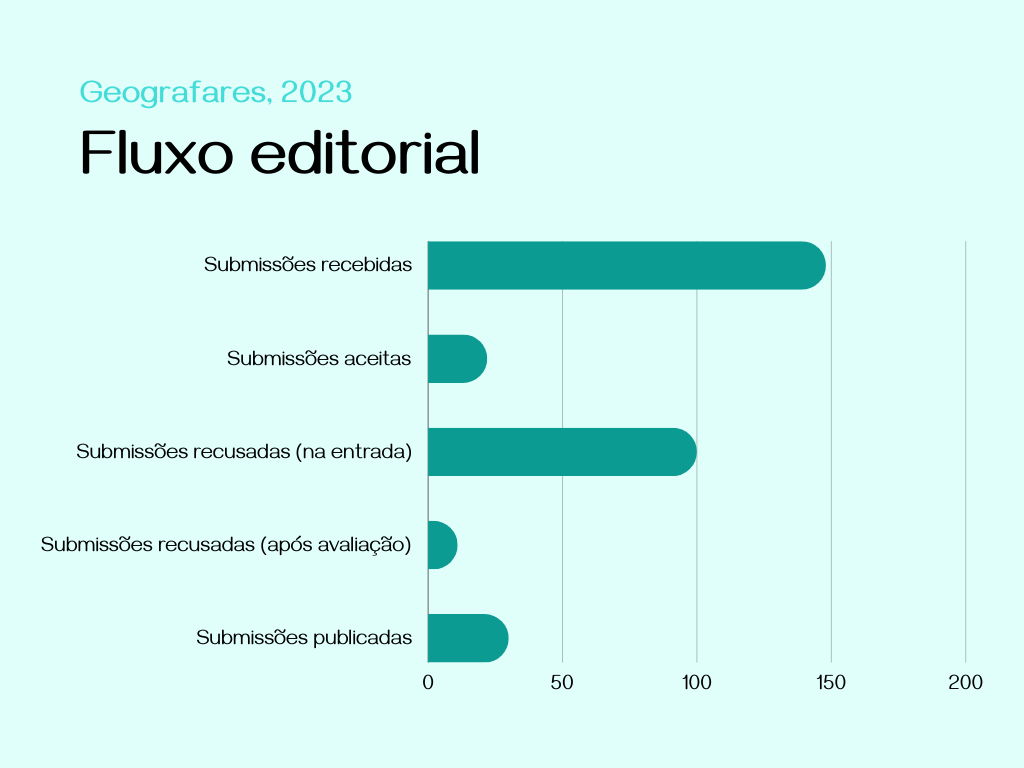Collective action and youth: territorialities of youth collectives in the city of Governador Valadares-MG, Brazil
DOI:
https://doi.org/10.47456/geo.v1i33.34217Keywords:
youths, youth collectives, territorialities, Governador Valadares, BrazilAbstract
This study aims to understand the multiple territorialities present in the context of youth groups and the relationships that produce them. The study on youth focuses on collective action associations and the relationships that young people establish with the city of Governador Valadares in Minas Gerais, Brazil, occupying space and producing territorialities. Youth collectives connect young people, promote sociability and enable mediation with the lived reality, creating and modifying relations with the urban space. By the notion of youth groups, it is understood that these are organized by young people and that they emerge from present situations, however, the organization model is not exclusive to youth, but corresponds to a trend of associativism today, as it presents more flexible structures, as well as more horizontal organizational and management dynamics.
Downloads
References
ALCADE, E. Cultura ZL: rede de coletivos Ermelino Matarazzo. São Paulo, EDICON, 2013
ALMEIDA, R. S. Juventude, direito à cidade e cidadania cultural na periferia de São Paulo. Revista do Instituto de Estudos Brasileiros, São Paulo, n. 56, p. 151-172, jun. 2013. Disponível em: <http://www.scielo.br/scielo.php?script=sci_arttext&pid=S0020-38742013000100007&lng=en&nrm=iso>. Acesso em: 24 mar. 2019.
ANGROSINO, M. Etnografía y observación participante en Investigación Cualitativa. Madrid: Edicones Morata, 2012.
DAYRELL, J. O jovem como sujeito social. Revista Brasileira de Educação, Rio de Janeiro, n.24, p. 40-52, set./dez. 2003.
DAYRELL, J. Um olhar sobre a juventude. In: DAYRELL, Juarez (Org). A música entra em cena: o rap e o funk na socialização da juventude. Belo Horizonte: Editora UFMG, 2005. p.21-44.
DAYRELL, J., CARRANO, P. C. Juventude e Ensino Médio: Quem é este aluno que chega à escola? In: DAYRELL, J; CARRANO, P; MAIA, CL (Orgs). Juventude e Ensino Médio: sujeitos e currículos em diálogo. Belo Horizonte: Editora UFMG, 2014.
ELIAS, N. A Sociedade dos Indivíduos. Rio de Janeiro: Jorge Zahar Editora, 1994.
ELIAS, N. Introdução à Sociologia. Edições 70, Reimp. Lisboa (PT), 2014
GOHN, M. G. Jovens na política na atualidade: uma nova cultura de participação. Caderno CRH, Salvador, v.31, n.82, p. 117 – 133, Jan/Abr, 2018.Disponível em: <http://www.scielo.br/scielo.php?pid=S0103-49792018000100117&script=sci_abstract&tlng=pt> Acesso em: 24 mar. 2019.
GOMES, R. A análise de dados em pesquisa qualitativa. In: MINAYO, Maria Cecília de Souza (Org). Pesquisa social: teoria, método e criatividade. 18ª ed. Petrópolis: Vozes,2001
HAESBAERT, R. Dos Múltiplos territórios à multiterritorialidade. Porto Alegre: UFRGS/ULBRA/AGB, 2004.
HAESBAERT, R. Território e multiterritorialidade: um debate. GEOgraphia, Niteroi, Ano IX, n.17, 2007, p. 19-46.
HAESBAERT, R. Territórios Alternativos. 3ª ed. São Paulo: Contexto, 2017.
MAGNANI, J. G. C. Festa no pedaço: cultura e lazer na cidade. São Paulo: Unesp, 2003.
MELUCCI, A. Acción colectiva, vida cotidiana y democracia. México: Centro de Estudos Sociológicos, 1999.
MONTOYA, Á. G. De Organizaciones a Colectivos Juveniles Panorama De La Participación Política Juvenil. Ultima Década, v. 18, p. 61–83, 2010 Disponível em: <https://www.redalyc.org/pdf/195/19515560004.pdf> Acesso em: 05 out. 2019
NOVAES, Washington. Eco-92: avanços e interrogações. Estud. av, São Paulo, v. 6, n. 15, p. 79-93, Ago/1992. Disponível em: < https://www.scielo.br/pdf/ea/v6n15/v6n15a05.pdf > Acesso em: 15 jan. 2020
PERALVA, A.; FIGEAC, J.; PATON, N.; NOGUEIRA, R. O legado de 2013: Coletivos de ativistas e a Agenda Política Brasileira. In: 41º Encontro Anual da ANPOCS (Caxambu) out. de 2017. 31p. Disponível em <https://www.anpocs.com/index.php/papers-40-encontro-2/gt-30/gt08-26/10660-o-legado-de-2013-coletivos-de-ativistas-e-a-agenda-politica-brasileira/file> Acessado em 04/09/2018
PRODANOV, C. C.; FREITAS, E. C. Metodologia do trabalho científico: métodos e técnicas da pesquisa e do trabalho acadêmico. 2 ed. Novo Hamburgo: Feevale, 2013.
QUINTANEIRO, T. Processo civilizador, sociedade e indivíduo na obra de Norbert Elias. Belo Horizonte: Argvmentvm, 2010.
REGILLO, R. Culturas juveniles: Formas políticas del desencanto. Buenos Aires: Siglo Veintiuno Editores, 2013.
SCHERER-WARREN, I. Dos Movimentos sociais às manifestações de rua: o ativismo brasileiro no século XXI. Política & Sociedade, v. 13, n. 28, set/dez de 2014. Disponível em: <https://periodicos.ufsc.br/index.php/politica/issue/view/2240> Acessado em: 24 mar. 2019
SOUZA, Q.; QUANDT, C. Metodologia de análise das redes sociais. In: DUARTE, F.; QUANDT, C.; SOUZA, Q. (org.) O tempo das redes. São Paulo, perspectiva, 2008. P. 31-63.
TATAGIBA, Luciana. 1984, 1992 e 2013. Sobre ciclos de protestos e democracia no Brasil. Política & Sociedade, Florianópolis, v.13, n.18, set-dez de 2014. Disponível em: <https://periodicos.ufsc.br/index.php/politica/issue/view/2240> Acesso em: 24 mar. 2019
TREVISOL, J. O Fórum Social Mundial e a cidadania: gênese e potencialidades de um movimento contra-hegemônico transnacional. Revista Espaço Pedagógico, v. 14, n. 2, 20 nov. 2017. Disponível em: < http://seer.upf.br/index.php/rep/article/view/7574 > Acesso em: 15 jan. 2020
TURRA NETO, N. Metodologias de pesquisa para o estudo geográfico da sociabilidade juvenil. RA´E GA, Curitiba, v. 23, p. 340-375, 2011. Disponível em: <https://revistas.ufpr.br/raega/issue/archive> Acesso em: 15 mai. 2018.
TURRA NETO, N. Vivendo entre jovens: a observação participante como metodologia de pesquisa de campo. Terr@Plural, Ponta Grossa, v.6, n.2, p. 241-255, jul/dez. 2012.
Downloads
Published
How to Cite
Issue
Section
License
Copyrights Declaration
Authors who publish in the journal agree with the following terms:
- Authors will keep their copyrights and grant the journal the right to their first publishing, simultaneously licenced under Creative Commons Attribution License which allows sharing their work with authorship recognition and initial release through this journal.
- Authors may sign additional contracts separately diffusing a non-exclusively version of the paper published in this journal (i.g. publishing in institutional repository or as a book chapter), once citing the authorship and initial release through this journal.
- Authors are encouraged to publicize and diffuse their paper online, for example onto institutional repositories or on their personal websites.



























